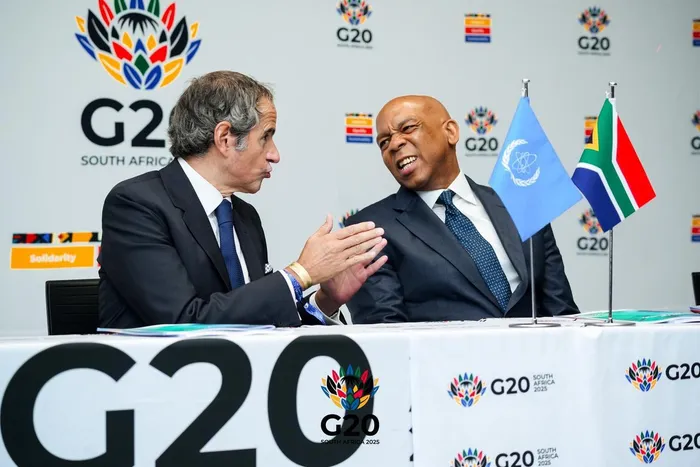G20 conference highlights the pivotal role of nuclear power in energy transition

International Atomic Energy Agency Director General Rafael Mariano Grossi and Electricity and Energy Minister Kgosientsho Ramokgopa delivered keynote addresses at the G20 Ministerial Nuclear Energy Conference.
Image: GCIS KwaZulu-Natal
The G20 Ministerial Nuclear Energy Conference discussed the recognition of nuclear energy not just as an alternative but as a cornerstone of a sustainable energy future.
The meeting of ministers, a side event of the G20 4th Energy Transition Working Group (ETWG), was held at the Coastlands Hotel and Conventions Centre in uMhlanga on Thursday.
Electricity and Energy Minister Kgosientsho Ramokgopa said that the advances in technology and science offer a pristine opportunity to ensure that there’s a rapid deployment of modern-day technologies of nuclear and SMR (small modular reactors).
"This gives us that opportunity.”
He highlighted nuclear energy’s role in providing a reliable, green base load. This, he explained, is crucial for the rapid and exponential integration of renewables, essential for reconfiguring the energy mix in various regions.
He said they needed to be able to answer doubters.
“One is to project nuclear in a negative light, and principal amongst those is the financing requirements to support the nuclear build programme. Of course, as we say, it’s an Achilles' heel that requires the necessary attention,” Ramokgopa said.
He noted that 83% of electricity comes from coal, but they are exploring repurposing coal-fired power stations to maintain quality jobs.
“Our ambition is to build a nuclear programme, initially the size of 5,000 megawatts, and we think that we can derive the benefits of industrialisation and ensure that there’s an exponential increase in the skills that are required to support that build programme,” Ramokgopa said.
International Atomic Energy Agency (IAEA) director general Rafael Mariano Grossi said nuclear long-term operation (LTO), is the easiest, cheapest, most effective way to keep CO2 emissions low.
He noted that energy infrastructure has been around for a century.
“So much for those who say that nuclear energy is expensive. A century of clean power, and this is what we are trying to do and to help,” Grossi said.
He cited a “glass ceiling” in nuclear, referring to the total exclusion of nuclear projects from international finance.
“In some cases, you have explicit provisions forbidding nuclear projects to be financed,” Grossi said.
He said he raised concerns with World Bank President Ajay Banga over a year ago about the baseless negative perception of nuclear technology. This narrative, perpetuated for years, lacked technological evidence and ignored the IAEA’s role as the nuclear watchdog.
The World Bank and IAEA signed an agreement in June in Paris, making it easier and more affordable for countries to implement nuclear programs, particularly regarding LTO.
“Once the page was turned for the World Bank and we signed this agreement, now I have around 20 international finance institutions wanting to sign agreements with the IAEA,” Grossi said.
He added that they are working closely with national regulators.
“Without independent, strong regulation, nuclear cannot thrive, cannot grow,” Grossi said. “So this is why we at the IAEA are supporting regulation.”
United States’ acting assistant secretary, William Joyce, announced that President Donald Trump’s four executive orders in late May initiate America’s nuclear renaissance, aiming to modernise regulations, streamline reactor testing, and revitalise the nuclear industrial base.
“In line with the goals of the South Africa G20, we also urge the World Bank and the other international financial institutions to support the financing of nuclear power projects in developing countries,” Joyce said.
thobeka.ngema@inl.co.za